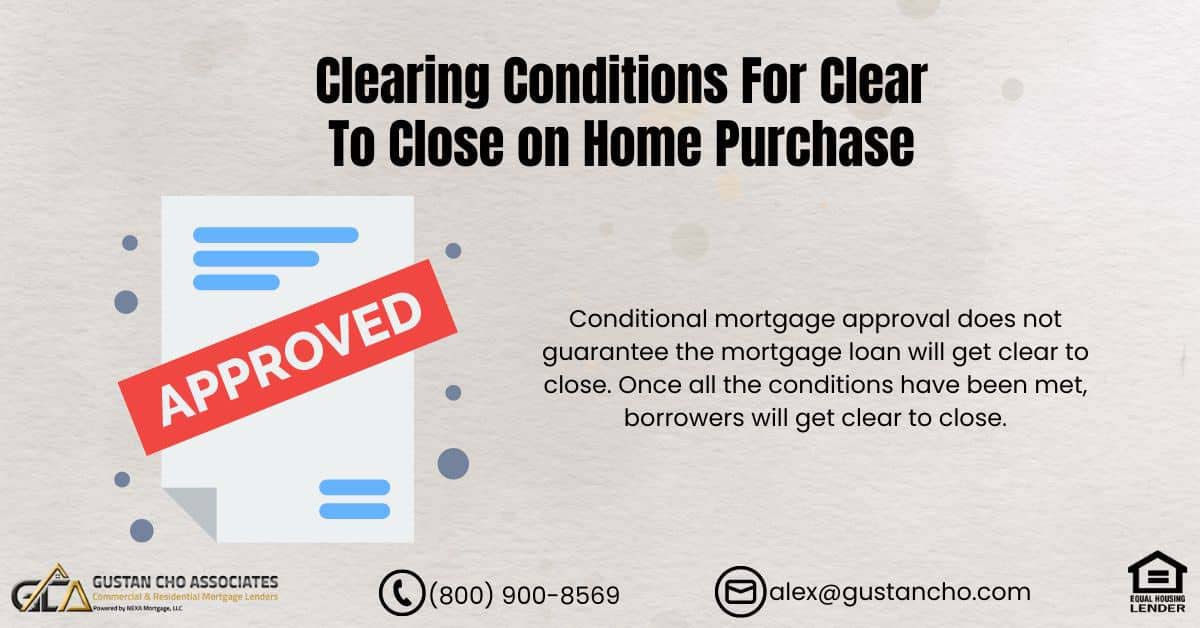This guide covers clearing conditions for clear to close on home purchases. Once mortgage borrowers have signed the mortgage application and the mortgage processor has processed it, it gets submitted to underwriting. A mortgage underwriter gets assigned to the file. After the underwriter thoroughly reviews the borrower’s applications and documents, the borrower will get conditional mortgage approval. Dustin Dumestre, a senior loan officer at Gustan Cho Associates and the Editor of Chief at F-1 Mortgage Group and host of Friday Mortgage Minutes explains about clearing conditions for clear to close as follows:
Conditional mortgage approval does not guarantee the mortgage loan will get clear to close. Once all the conditions have been met, borrowers will get clear to close.
Conditional mortgage approval is a great sign that the mortgage will soon close. It’s the road to a clear to close. Once borrowers get conditional loan approval, they should work on clearing conditions as soon as possible. Not clearing conditions for clear to close promptly delays a clear to close. In this article, we will discuss clearing conditions for clearing to close on home purchases and refinances.
How Close to Closing Do You Get Clear to Close?
Obtaining a “clear to close” (CTC) in the mortgage process can vary in timing based on various factors, such as the lender’s policies, the loan file’s complexity, and the efficiency of all parties involved. Generally, a clear to close is issued after all underwriting conditions have been met and the lender has verified all required documentation. In the following sections, we will cover a general timeline of when you might expect to receive a clear to close:
- Initial Underwriting Approval: This typically happens after your loan application has been submitted and the lender has reviewed your financial documents, credit history, and other relevant information. Initial approval has yet to guarantee a clear to close.
- Conditional Approval: Once the initial underwriting is complete, the lender may provide a conditional approval that includes a list of conditions or additional documents required to finalize the loan.
- Submission of Conditions: You and your loan officer work to satisfy the conditions listed in the conditional approval. This may involve providing updated financial documents, explanations for certain items, or additional information requested by the underwriter.
- Underwriter Review: Once you’ve submitted all required documents and conditions, the underwriter reviews everything to ensure compliance with the lender’s guidelines and any applicable regulations.
- Clear to Close: After the underwriter is satisfied with all documentation and conditions that have been met, they issue the clear to close. This indicates that the loan is ready for closing, and the final steps can be initiated.
The timing of the clear to close can vary. Some lenders may issue it a week or more before closing, while others might do so just a few days before. Factors such as the complexity of the loan, the responsiveness of all parties involved, and any last-minute issues that arise can influence the timing.
Examples of Clearing Conditions For Clear To Close on Home Purchase
Mortgage underwriters give borrowers time to submit the conditions on the conditional loan approval. It is the job of the mortgage processor to clearing conditions for clear to close. It is best to get started as soon as possible in getting all the conditions to the processor so they can submit it to underwriting. Processors normally make sure all of the conditions are complete before submitting the conditions to underwriters.
If the processor submits partial conditions, the whole mortgage loan package will be kicked back. The whole process will need to get restarted and will cause delays.
For example, if all conditions have been collected and submitted to the underwriter, the underwriter will not drop whatever he or she is doing and sign off on a clear to close. Once all conditions have been submitted for a clear to close, the underwriter normally takes 24 to 48 hours or more to review the conditions and sign off on the clear to close. If any of the conditions is missing or the file is incomplete, it gets sent back to the processor, and this will cause delays in getting clear to close. This is why delays in clear to close happen. If clearing conditions for clear to close is not expedited by the mortgage processor, the real estate, closing gets delayed.
What is Conditional Approval?
It’s important to stay in close communication with your loan officer and be prepared to promptly provide any additional information or documents requested to help expedite the process and ensure a smooth closing. Speak With Our Loan Officer for Mortgage Loans. Once a borrower’s financial documents, credit history, and other relevant information have undergone an initial underwriting review, conditional approval in the mortgage process is a significant step toward securing a loan.
What is Next After The Conditional Loan Approval
The lender tentatively approves the loan application subject to specific conditions being met. These conditions could include providing additional documentation, explaining certain financial transactions, resolving outstanding credit issues, or meeting specific debt-to-income ratio requirements. The final steps towards closing the loan can be initiated.
It’s important for borrowers to actively participate in addressing conditions during the conditional approval stage to help ensure a smooth transition to clear, close, and finalize the loan process.
The borrower and their loan officer work together to satisfy these conditions, submitting any required documents or clarifications as requested by the underwriter. Once all conditions are met, the underwriter conducts a final review to ensure compliance, after which a clear to close is issued, indicating that the loan is fully approved.
Delays With Clearing Conditions For Clear To Close
Sometimes, delays happen in getting conditions, not from borrowers but from the source itself. For example, if borrowers had multiple jobs in the past two years, we need employment verification from all previous employers. Many previous employers are in no hurry to help ex-employees. Many get the proper verification of employment form signed and back to the processor. Other common delays include errors on the borrower’s credit report. A credit supplement needs to get done, which can take up to a week, and because of a delay in a clear to close. Rapid Rescores take anywhere between 3 to 5 business days.
Delays Clearing Conditions For Clear To Close Delays The Closing
In some cases, the mortgage processor submits all of the conditions to the underwriter, and the underwriter checks off the submitted conditions but requests additional conditions on the mortgage file. This will cause delays in getting a clear to close and most likely delay the mortgage loan closing. Homebuyers who need to qualify for a mortgage with a lender licensed in 48 states, including Washington, DC, Puerto Rico, and the U.S. Virgin Islands, with no overlays on government and conventional loans, please get in touch with Alex Carlucci the National Development Manger at Gustan Cho Associates at 800-900-8569 or text us for faster response. Or email us at alex@gustancho.com. The team at Gustan Cho Associates closes on all of our pre-approvals.
The Importance of a Solid Pre-Approval
We do not issue pre-approvals if we have any doubts about closing. Not just closing but closing on time. The team at Gustan Cho Associates does TBD underwriting pre-approvals. TBD underwritten pre-approvals at Gustan Cho Associates are full credit approvals underwritten and signed off by mortgage underwriters. The only thing missing with TBD underwriting pre-approvals is the property. Once the homebuyer gets into a written executed real estate purchase contract, the underwriter will underwrite the property and issue a clear to close. Click here to get pre-approval for Mortgage Loans
What if My Credit Score Changes Before Closing?
If your credit score changes before closing on a mortgage loan, it can have varying impacts depending on the extent of the change and the lender’s policies. Minor fluctuations, such as small increases or decreases, may not significantly affect your loan approval if your score exceeds the lender’s minimum requirements.
Major changes, such as a substantial increase or decrease in your score, can lead to a reassessment of your loan application by the lender. Strengthening your score significantly could enhance your application and lead to better loan terms, like a lower interest rate.
Strengthening your application with a significant increase in your score may lead to better loan terms, such as a lower interest rate. On the other hand, a significant drop in your score might raise concerns for the lender and necessitate a review of your financial information to ensure continued compliance with their underwriting guidelines. It’s crucial to inform your loan officer promptly about any significant credit score changes and be prepared for potential adjustments in your loan terms based on the updated credit information and the lender’s reassessment.
How To Close a Mortgage Loan on Time
If you have any questions about Clearing Conditions for Clear to Close on Home Purchase or you need to qualify for FHA loans with a lender with no overlays on government or conforming loans, please contact us at Gustan Cho Associates at 800-900-8569. Text us for a faster response. Or email us at alex@gustancho.com . The team at Gustan Cho Associates is available 7 days a week, on evenings, weekends, and holidays.
FAQ: Clearing Conditions For Clear To Close on Home Purchase
1. What is conditional approval in the mortgage process? Conditional approval in the mortgage process refers to the lender’s tentative approval of a loan application, subject to specific conditions being met by the borrower. These conditions could include providing additional documentation, explaining certain financial transactions, resolving outstanding credit issues, or meeting specific debt-to-income ratio requirements.
2. What happens after conditional approval is granted? After conditional approval is granted, the borrower and their loan officer work together to satisfy the conditions outlined by the lender. This may involve providing updated financial documents, explanations, or clarifications as requested by the underwriter.
3. What is the significance of clearing conditions for clear to close? Clearing conditions for clear to close is a crucial step in the mortgage process. It indicates that all required documentation and conditions have been met, and the loan is ready for closing. Please clear conditions promptly to avoid delays in obtaining a clear to close.
4. How does the timing of clear to close vary in the mortgage process? Factors such as the lender’s policies, the complexity of the loan file, and the efficiency of all parties involved can cause variation in the timing of clear to close. Some lenders may issue clear to close a week or more before closing, while others might do so just a few days before.
5. What can cause delays in clearing conditions for clear to close? Delays in clearing conditions for clear to close can occur for various reasons, such as errors on the borrower’s credit report, delays in obtaining required documentation, or additional conditions requested by the underwriter after initial submission.
6. How can borrowers expedite the process of clearing conditions for clear to close? Borrowers can expedite the process of clearing conditions for clear to close by promptly providing any additional information or documents requested by the lender or underwriter. Staying in close communication with the loan officer and addressing conditions promptly can help avoid delays.
7. What is the role of the mortgage processor in clearing conditions for closing? The mortgage processor is crucial in clearing conditions for closing. They are responsible for gathering all required documentation, ensuring completeness and accuracy, and submitting the conditions to the underwriter for review.
8. How does a change in credit score before closing impact the mortgage loan? A change in credit score before closing can impact the mortgage loan terms and approval. Minor fluctuations may not have a significant impact, but major changes could lead to a reassessment of the loan application and potential adjustments in loan terms or requirements.
9. What should borrowers do if their credit score changes before closing? Borrowers should promptly inform their loan officer about any significant changes in their credit score before closing. Proactive and providing updated information can help address potential impacts on the loan application and ensure a smoother closing process.
10. What are some common delays in the clear-to-close process? Common delays in the clear-to-close process can include errors in documentation, delays in obtaining required information or verifications, additional conditions requested by the underwriter, or issues with third-party vendors involved in the loan process.
This blog about Clearing Conditions for Clear to Close on Home Purchase was updated on March 26th, 2024.
Fill up form with your requirements for Mortgage Loans, We will contact you back










